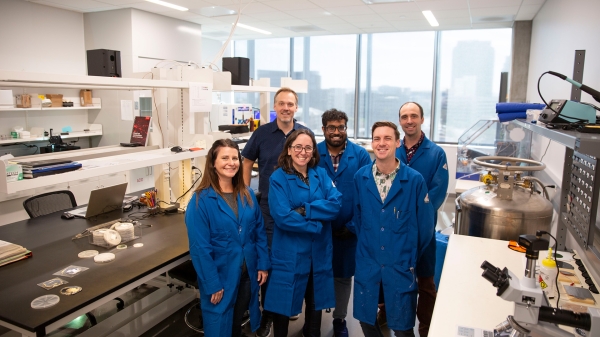ASU team receives John Templeton Foundation funding to explore relationship between science, craftwork, soulwork

Sir John Templeton. Photo by John Templeton Foundation.
A team of Arizona State University researchers from the Lincoln Center for Applied Ethics, the School of Life Sciences and the Center for the Study of Religion and Conflict was recently awarded funding by the John Templeton Foundation to research how ideas of craftwork and soulwork can transform laboratory culture.
Historically, religious traditions have used craftwork, the small steps one takes to complete their job, as a means of soulwork, or the progression in one’s spiritual purpose.
“The Buddhist monk who progresses toward enlightenment by cooking for others is one example,” said Erica O’Neil, a project manager at the Lincoln Center and one of the researchers on the project.
The research team aims to create an open-access, revisable toolkit for scientific researchers, specifically those at the forefront of genomics and genome editing, that empowers them to understand how their craftwork has a significant, direct impact on human life.
“Meaning-making through doing the work is a tradition in spiritual communities, and this grant explores how those practices can be translated for the lab and help scientific researchers create products that are more attuned to the needs of society,” O’Neil said.
The collaboration includes experts in spiritual traditions alongside ASU humanists and scientists from three participating labs. The project is led by Gaymon Bennett, associate director of the Lincoln Center and associate professor of religion, science and technology. He is joined on the project by fellow ASU humanists O’Neil, J. Benjamin Hurlbut and Jason Robert; ASU neurobiologists B. Blair Braden, Stephen Helms Tillery and Sarah Stabenfeldt; as well as Gil Stafford, director of the Wisdom’s Way school of spiritual direction, and Carolyn Forbes, assistant director of ASU's Center for the Study of Religion and Conflict.
“Geneticists are responsible for researching our collective biological future, but we expect them to also commodify those futures in the process,” O’Neil said. “That same responsibility for our future is also felt by leaders of spiritual practice across traditions, thus creating opportunity for shared wisdom.”
The team’s research summary states that the project will advance craftwork’s relationship to soulwork, with the expectation that learning from spiritual formation practices will better prepare those in the advanced life sciences to navigate the power they wield in a way that attunes scientific work to the larger concepts of human life. Over the next two years, the team will conduct preliminary research in the three participating labs to further understand how craftwork as soulwork can benefit scientific researchers and their work.
More Science and technology

ASU startup Crystal Sonic wins Natcast pitch competition
Crystal Sonic, an Arizona State University startup, won first place and $25,000 at the 2024 Natcast Startup Pitch Competition at…

Celebrating '20 Years of Discovery' at ASU’s Biodesign Institute
Editor’s note:The Biodesign Institute at Arizona State University continues to celebrate its landmark 20th anniversary with this…

Rocket science: Students land opportunity to create inflatable lunar pad for NASA
Editor's note: The ASU AEGIS team won the Best Systems Engineering award — one of two awards given to the six teams that…